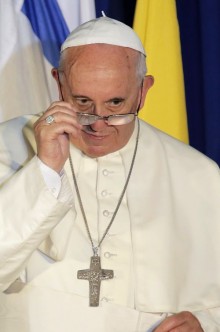Every day our world moves along new trajectories of thoughts, events, and decisions. Obstacles change, but man and his desire for inner spiritual development remain unchangeable. Several weeks after the visit to Southern Korea Pope Francis traditionally communicated with journalists on the board of a plane. They asked him many questions connected with the war, peace, and reorientation of political system of coordinates. Namely then the Pope made a statement which was a shock for the world mass media: he does not exclude that he will repeat the deed of Pope Benedict XVI because of the state of health. “I’m trying to focus on my sins and mistakes, not to think that I am someone outstanding. Because I know that this won’t last for long, 2-3 years, then I’ll go to the House of the Father,” Pope Francis emphasized.
CHURCH OF THE POOR AND A STRANGE POPE
On February 2013 Pope Benedict XVI renounced the Holy Throne. Benedict XVI was the first Pope in 600 years to do this. In 1415 Pope Gregory XII did the same. Ukrainian Christian new media published this news with an official address of Benedict XVI where the Pope explains that because of poor state of health, illnesses, and old age he is not able to take care of his congregation. On March 13 the Conclave convoked to elect the new Supreme Bishop. It was cardinal from Argentina Jorge Mario Bergoglio. At that time the Ukrainian media commented differently the step taken by Pope Benedict XVI. Specialized Christian Internet resources published conversations with clergy, for whom this decision is a step to renew the church and on the whole a dialog in the world. Secular media however focused its attention on scandalous sides of Pontificate and made it look that the Pope couldn’t solve all the problems in the church, that is why he refused from the mission. Besides, we saw one more phenomenon, namely inclination for mysticism. After all, the media space has already had this “illness,” when the news about the end of the world started to be spread non-stop. So, Ukrainian journalists together with their colleagues from abroad tried to find an oracle in the renunciation of Pope Benedict XVI. We remember the photo with a lightning above St. Peter’s Cathedral from social media or legend about a dark-skinned Pope, that the life of the church will decay after he comes. Therefore on March 2013 another media myth attracted millions of looks to St. Peter’s Square, where after white smoke an unknown cardinal from Argentina emerged before the face of the world public. The world froze waiting. “Good evening!” with these words started the Pontificate of Pope Francis whose slogan is “Church for the poor.” And this model of behavior can be traced not only on words, but also concrete actions. We can remember how photos of Pope in a subway and his refusal from traditional red shoes appeared on social media. The Ukrainian Internet resources spread photos where Pope blesses a boy with special needs, and Christian web resources spread the photo from Pope Francis’s meeting with Constantinople Patriarch Bartholomew. This was a precedent in entire history of Pope Inaugurations. Later there was much confusion in everyday protocol of Pope’s life: refusal from security, ordering breakfast on his own, phone calls with support, visits to poor people abandoned by society. Several months after being elected Pope Francis entered Top 100 most influential people in the world.
A “UKRAINIAN” POPE
After being elected Pope Francis became very close to Ukrainian religious circles, especially the community of Ukrainian Greek-Catholic Church. Because of the commentaries of His Beatitude Sviatoslav about personal acquaintance with Cardinal Jorge Mario Bergoglio journalists expected that a patriarchate of Ukrainian Greek Catholic Church will be created. The Pope didn’t remain indifferent to the recent events in Ukraine. He has many times appealed to the public as for the complicated political situation. Before the tragic events in Maidan Pope Francis prayed for the peace in the state and let doves fly into the sky, and in November approved the struggle of Ukrainian students for the right to live in a European country. He was practically one of the first adherents of the Revolution of Dignity when the world was expressing its moderate positions. During the past months Pontific has been praying for the end of the war in the east. In particular he said this when he greeted Ukrainians on Independence Day and said that our state is his favorite land.
I know that many of my friends are skeptical about the actions of Pontific: some consider him too bizarre, other say that in fact this is an image specially designed by Vatican. But for me Pope Francis will always remain a healthy model of communication in the church, where the attention is paid above all to those who are on the margin of the society because of their material state, to those who in the first centuries of Christianity were the groundwork of this community, for we remember how the first Christians lived and who Christ’s apostles were. The modern world has changed its guidelines. It associates poverty with dirt, impossibility to realize oneself. We come to thinking that this is how we should live. But the Pope offers to live according to other models: he always visits the poorest areas to emphasize that for him not the material state, but the inner world is the most important. So, the time of Pope Francis is ruination of stereotypes and return of real things. Humankind needs reorientation in the system of its thinking especially now in the time of military conflicts in Near East, in Ukraine, in African continent. Of course, I was upset by the statement of the Pope. Let’s hope that the leaders of other Christian communities will follow the example of the Pontific and change the vectors of communication between the Church and the society.








